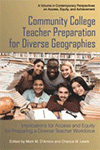
Community College Teacher Preparation for Diverse Geographies
Implications for Access and Equity for Preparing a Diverse Teacher Workforce
Edited by:
Mark M. D'Amico, University of North Carolina at Charlotte
Chance W. Lewis, University of North Carolina at Charlotte
A volume in the series: Contemporary Perspectives on Access, Equity, and Achievement. Editor(s): Chance W. Lewis, University of North Carolina at Charlotte.
Published 2019
Community colleges serve as the open door to higher education for marginalized, place bound, and/or financially challenged students and communities. One of the key ways marginalization occurs in diverse geographies is through access limitations: access to affordable postsecondary education, access to curricula that lead to viable professions, access to diverse educational role models, and access to employment opportunities that can sustain communities. This underscores the importance of understanding “place” when addressing access and equity in higher education and the role of community colleges.
The discussion of access and equity through the community college has implications for teacher education. Considering the documented importance of having a diverse teacher workforce in K-12 schools and the current mismatch between the diversity of students and the teachers in their schools, community colleges have a significant
role to play.
This book explores many topics related to the community college role in K-12 teacher education, including the community college mission, the policy landscape, partnerships, the transfer function, the community college baccalaureate, and others. Throughout the volume, the authors explore implications of access, equity, and geography and conclude with recommendations to guide future research and practice.
CONTENTS
Introduction: Teacher Education and the American Community College— Expanding Opportunities for Preparation Across Geographic Regions, Mark M. D’Amico and Chance W. Lewis. Community College Teacher Education: Fulfilling the Workforce Development Mission for Diverse Geographies, Regina L. Garza Mitchell, Brett Geier, and Cherrelle Singleton. The State Policy Landscape and Advancing Equity for Student Success and Teacher Education Through Community Colleges, Shun Robertson. How an Unaccompanied Minor Became Teacher of the Year: The Unrealized Potential of the Community College, Spencer Salas, Bradley Smith, Bobbi Siefert, and Astrid Emily Francis. Innovative Partnerships for Teacher Education, Pamela L. Eddy and Tracey L. Schneider. The Transfer Function and the Teacher Pipeline for Diverse Communities, Dimitra Jackson Smith, Rhonda Lewis, and Leslie Singleton. Community College Baccalaureate: An Evolving Teacher Preparation Option, Deborah L. Floyd, Gianna Ramdin, and Cristobal Salinas Jr. Attracting Talent in Diverse Rural Geographies: Community College Transfer Students, Douglas A. Smith and Henry Tran. Early Childhood and A.A.S. Articulation, Kate Algozzine, Adam Atwell, and Kristen Monteith. Conclusion: Leveraging the Community College for Teacher Education in Diverse Geographies, Mark M. D’Amico and Chance W. Lewis. About the Contributors.
-
Paperback978-1-64113-647-1
Web price: $45.04 (Reg. 52.99)
-
Hardcover978-1-64113-648-8
Web price: $80.74 (Reg. 94.99)
- eBook978-1-64113-649-5

- EDU015000 - EDUCATION: Higher
- EDU053000 - EDUCATION: Training & Certification
- EDU048000 - EDUCATION: Inclusive Education
-
 Advancing Inclusive Excellence in Higher Education
Practical Approaches to Promoting Diversity, Equity, Inclusion, and Belonging
Advancing Inclusive Excellence in Higher Education
Practical Approaches to Promoting Diversity, Equity, Inclusion, and Belonging
-
 Developing Culturally Responsive Learning Environments in Postsecondary Education
Developing Culturally Responsive Learning Environments in Postsecondary Education
-
 Economic, Political and Legal Solutions to Critical Issues in Urban Education and Implications for Teacher Preparation
Economic, Political and Legal Solutions to Critical Issues in Urban Education and Implications for Teacher Preparation
-
 Imagining the Future
Historically Black Colleges and Universities - A Matter of Survival
Imagining the Future
Historically Black Colleges and Universities - A Matter of Survival
-
 Post-Secondary Planning for All
Approaches to College and Career Readiness Counseling for Special Populations
Post-Secondary Planning for All
Approaches to College and Career Readiness Counseling for Special Populations
-
 Preparing to Lead
Narratives of Aspiring School Leaders in a "Post"-COVID World
Preparing to Lead
Narratives of Aspiring School Leaders in a "Post"-COVID World
-
 Unveiling the Cloak of Invisibility
Why Black Males are Absent in STEM Disciplines
Unveiling the Cloak of Invisibility
Why Black Males are Absent in STEM Disciplines

